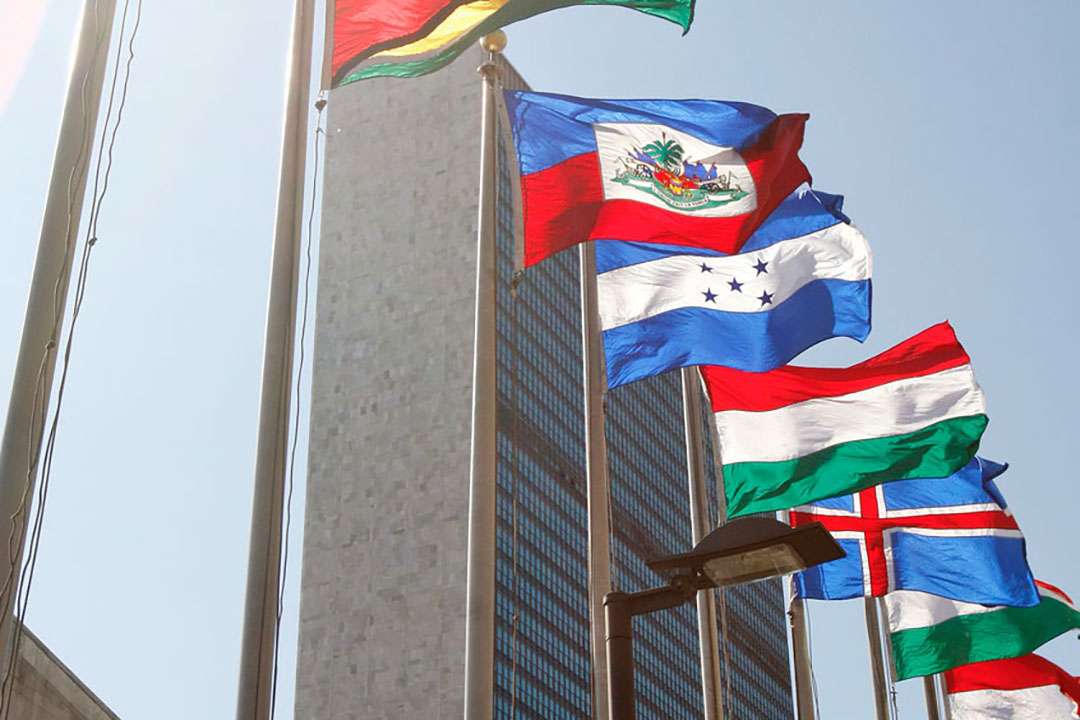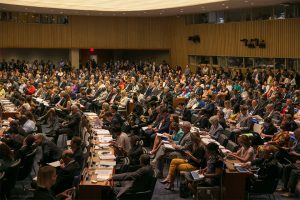11 July 2018: The co-facilitators from Switzerland and Mexico have circulated the final draft of the Global Compact for Safe, Orderly and Regular Migration. In an accompanying letter, they invite UN Member States and all relevant stakeholders to a meeting on 13 July to conclude the negotiations, and express their conviction that the final draft “represents the way forward on international cooperation in the field of international migration.” The co-facilitators note that the UNGA President, the UN Deputy Secretary-General, and the Secretary-General of the Intergovernmental Conference will attend the meeting, and all relevant stakeholders are invited as well.
The co-facilitators for the process, Jürg Lauber, Permanent Representative of Switzerland, and Juan José Gómez Camacho, Permanent Representative of Mexico, also note that the final draft is the result of an open, transparent and inclusive process. The preparatory process for the global compact started in April 2017 and comprised a consultation phase (thematic sessions, regional consultations and stakeholder consultations), a stocktaking phase and six months of intergovernmental negotiations.
The last round of negotiations is taking place from 9-13 July 2018, at UN Headquarters in New York, US. During the first two days, delegates considered the third revised draft of the compact (‘Draft Rev 3’) issued on 29 June 2018. Following these discussions on 9-10 July, the co-facilitators released the final draft on 11 July, taking into account views expressed by delegations. The final draft includes a preamble and sections on: “Our Vision and Guiding Principles;” “Our Cooperative Framework”; implementation; and follow-up and review.
The cooperative framework comprises 23 objectives. Each objective contains a commitment, followed by a range of actions considered to be relevant policy instruments and best practices. The objectives seek to, inter alia: minimize the adverse drivers and structural factors that compel people to leave their country of origin; ensure that all migrants have proof of legal identity and adequate documentation; enhance availability and flexibility of pathways for regular migration; prevent, combat and eradicate trafficking in persons in the context of international migration; provide access to basic services for migrants; eliminate all forms of discrimination and promote evidence-based public discourse to shape perceptions of migration; invest in skills development and facilitate mutual recognition of skills, qualifications and competences; and cooperate in facilitating safe and dignified return and readmission, and sustainable reintegration.
The compact is the product of an unprecedented review of evidence and data, the final draft notes.
The final draft notes that the compact is the product of an unprecedented review of evidence and data, offers a “360-degree vision of international migration,” and recognizes that safe, orderly and regular migration works for all when it takes place in a “well-informed, planned and consensual manner.” It is based on a set of “cross-cutting and interdependent” guiding principles, namely: people-centered; international cooperation; national sovereignty; rule of law and due process; sustainable development; human rights; gender-responsive; child-sensitive; whole-of-government approach; and whole-of-society approach.
The draft commits governments to facilitating and cooperating for “safe and dignified return” and to guaranteeing due process, individual assessment and effective remedy, “by upholding the prohibition of collective expulsion and of returning migrants when there is a real and foreseeable risk of death, torture, and other cruel, inhuman, and degrading treatment or punishment, or other irreparable harm.” It encourages all UN Member States to develop, as soon as practicable, ambitious national responses for the implementation of the Global Compact, and to conduct regular and inclusive reviews of progress at the national level, “such as through the voluntary elaboration and use of a national implementation plan.” It also requests the UNGA President to launch and conclude, in 2019, open, transparent and inclusive intergovernmental consultations to determine the precise modalities and organizational aspects of the International Migration Review Fora.
The compact is scheduled to be adopted during intergovernmental conference convening from 10-11 December 2018, in Marrakesh, Morocco. [Co-facilitators’ Letter on Compact Final Draft] [Migration Compact Final Draft] [SDG Knowledge Hub story on 9 July discussions]

